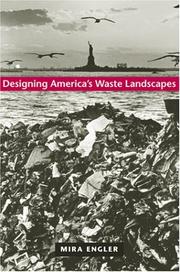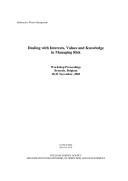| Listing 1 - 2 of 2 |
Sort by
|

ISBN: 0801878039 9780801878039 Year: 2004 Publisher: Baltimore : J. Hopkins University Press,
Abstract | Keywords | Export | Availability | Bookmark
 Loading...
Loading...Choose an application
- Reference Manager
- EndNote
- RefWorks (Direct export to RefWorks)
One of the most visible consequences of our society's breakneck level of production and consumption is the increasing amount of land designated as landfill and other waste disposal and processing sites. Often located in marginal areas or adjacent to politically and economically dispossessed communities, these places are usually ignored by mainstream society, as is the garbage that fills them. Even with the greater awareness of the problems of waste disposal inspired by recycling programs and anti-littering ads, we would much rather take the garbage out than think about where its going. In 'Designing America's Waste Landscapes', landscape architect and scholar Mira Engler takes a close look at the landfills, recycling and waste transfer centers, and sewage treatment plants that accommodate and redistribute the by-products of consumption. For Engler, waste is not only a pervasive, essential, and constructive process of civilization it is a key element in the way we consider, order, and shape our landscape. Yet the overwhelmingly negative, defensive perceptions we have of these places -- and their marginalization within public debate -- limits our ability to respond creatively and effectively to the growing problem of waste disposal. Engler addresses two distinct aspects of waste landscapes in America: the historic and cultural context of waste and the theories, practices, and concerns of the planners, engineers, landscape designers, and other waste management professionals. She reviews the physical evolution of waste sites across the country, scrutinizes perceptions and representations of these landscapes, and highlights attempts by environmental designers and artists to change public perceptions. Illustrated with more than 70 photographs, maps, drawings, and other images, 'Designing America's Waste Landscapes' is a cogent and compelling inquiry into the scientific, environmental, and aesthetic parameters of cutting-edge waste management technology and design.

ISBN: 9264007318 9786610171453 1280171456 9264007326 9789264007321 Year: 2004 Publisher: Paris : Nuclear Energy Agency, Organisation for Economic Co-operation and Development,
Abstract | Keywords | Export | Availability | Bookmark
 Loading...
Loading...Choose an application
- Reference Manager
- EndNote
- RefWorks (Direct export to RefWorks)
Radioactive waste management is an area of public interest in which stakeholder involvement has largely proven itself to be beneficial to all parties and processes concerned. With growing experience, sharing best practice can be useful at the international level. These workshop proceedings deal with the local partnership methodology employed in Belgium in order to develop an integrated proposal to the national Government to construct and operate a disposal facility for low-level radioactive waste that is adapted to local conditions. The partnerships are formed amongst representatives of local organisations in affected communities and representatives of the Belgian National Radioactive Waste Management Agency.
Nuclear energy --- Environmental protection. Environmental technology --- Monograph --- RADIOACTIVE WASTE MANAGEMENT --- Radioactive waste disposal in the ground --- Radioactive waste repositories --- Low level radioactive waste disposal facilities --- Risk assessment --- LLRW disposal facilities --- LLRW disposal sites --- LLRW facilities --- LLRW storage facilities --- Low level radioactive waste disposal sites --- Low level radioactive waste facilities --- Low level radioactive waste storage facilities --- Radioactive waste sites --- Nuclear waste repositories --- Geological repositories --- Burial of radioactive wastes --- Ground radioactive waste disposal --- Underground radioactive waste disposal --- Hazardous waste sites --- Waste disposal in the ground --- Belgium
| Listing 1 - 2 of 2 |
Sort by
|

 Search
Search Feedback
Feedback About UniCat
About UniCat  Help
Help News
News